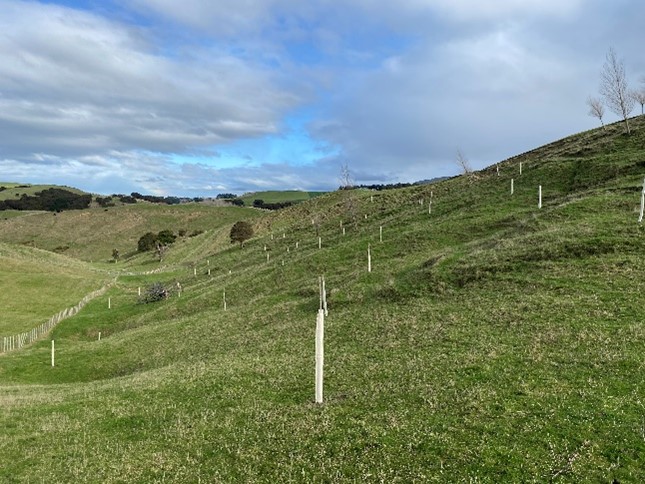Erosion can devalue your property and have negative effects downstream. ![Image not found]()
Fence and plant to prevent erosion
- Fencing off waterways to exclude stock.
- Plant poplar and willow 'poles'. The fast-growing trees have expansive root systems for ground stabilisation, and also provide stock shade and amenity values. Poles can be planted with sleeves to protect them from stock and cost $20 to $30 each, including Dynex sleeves and planting labour.
Learn more about Akura Nursery
Wellington Regional Erosion Control Initiative
The Wellington Regional Erosion Control Initiative (WRECI) started in 2009 in conjunction with the Ministry for Agriculture and Forestry (now Ministry for Primary Industries) to target the erosion prone areas in the Wairarapa considered the most in need of treatment. These were chosen based on the rates of sediment discharge and percentage of erosion prone land in the catchment.
From 1 July 2015 the programme changed to target high priority Land Use Capability (LUC) classifications over the whole region. For information on what areas of your property qualify for WRECI funding please contact us at Environment.Restoration@gw.govt.nz.
Sustainable Plant Protector Trial
Plastic sleeves are commonly used to protect young poplar and willow plants from livestock. While effective, these sleeves can become environmental pollutants if not collected properly.
Greater Wellington is trialling wool-based biodegradable sleeves as an alternative to plastic. These sleeves aim to protect plants while breaking down naturally over time.
 About the trial
About the trial
- Where: A farm near Masterton, Wairarapa.
- When: The trial began in winter 2024 and will run for five years.
- What: We’re testing 50 wool sleeves alongside 50 recycled plastic sleeves to compare durability and performance.
- Why: To explore sustainable planting solutions for landowners and farmers.
What we’re looking for
Over the next five years, we’ll assess the wool sleeves for:
- Their durability when exposed to livestock in the paddock.
- The potential to cause damage to young trees, such as rubbing or harming soft bark.
- Their ability to withstand harsh weather conditions, including high winds and heavy rain.
- Whether they provide adequate protection until the trees develop rough bark.
- How well they accommodate tree growth, ensuring they don’t split as the trees outgrow them.
- How well they biodegrade.
Why it matters
This trial reflects Greater Wellington’s commitment to supporting sustainable land management. If successful, wool sleeves could provide an eco-friendly alternative and a way to reduce reliance on plastic in rural settings.
Get in touch
- Phone:
- 0800496734
- Email:
- info@gw.govt.nz
